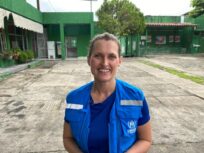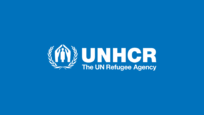From Syria to Sweden: Eiad´s perilous voyage across the Mediterranean
Eiad’s wife did not want him to embark on the perilous journey across the Mediterranean Sea to safety in Europe, but Eiad believed it was their only option. They had tried to build a new life in Egypt, but after two years in the country, Eiad realized he would not be able to provide a good future for his young children there. “Life wasn’t very good in Egypt”, he explains. In spite of his wife’s protests, Eiad decided to risk his life in a rickety boat sailing from Egypt to Italy. His wife and children returned to Damascus. “I was more worried about the kids”, he says. “I thought that if my life will finish, it will finish anyway – in Egypt, in the sea, wherever.”
After one and a half months of searching, he made contact with a human smuggler. The price for getting to Europe: 2,500 dollars. “We went in a group so it would be cheaper. The safest way to travel to Europe is through Turkey but it’s much more expensive. Sometimes, it can cost more than 8000 dollars per person” says Eiad. He describes the five-day boat journey to Italy with more than 300 others as “hell”- people were thrown into the boat and the smugglers did not care if they fell into the water. “If they had animals with them, they would take better care of them because they’re worth more to them”, says Eiad. Still, there was a sense of solidarity between passengers. Eiad recalls how two people almost fell off the boat in their sleep but were caught by the other passengers.
After reaching the shores of Italy, Eiad headed towards Northern Europe and arrived in Sweden on 12 October 2014. Coming here was a great relief, but life as a refugee has its daily struggles. “I miss my family” says Eiad, explaining how he had to adjust to his new life at the asylum-seeker reception centre in Farsta, Stockholm. “Starting over is not easy and leaving your country without your family… it’s hard. A lot of people who came here didn’t want to leave their lives behind in Syria. But it is impossible to give them back the same life here…They are forced to change” he says sadly.
For 36-year-old Eiad, a former shop and restaurant owner, living a slower paced life at the reception centre is a challenge. He often plays cards with some of the other people at the centre to make time pass faster and sometimes he also plays football. “But I have a problem with my back so I can’t do too much sport.” He believes life moves slower in Sweden. “In Syria, we do everything fast. A lot of Arabs find this very frustrating because we are always in a hurry” says Eiad with a laugh,
“We want things to happen faster, and we want to be reunited with our families sooner.”
Eiad says he has not started his life in Sweden yet, not without his family. “Your mind is not clear, it’s with your family, your kids, and you’re waiting to see them.” But despite the continuing concerns for his family, Eiad is hopeful for the future. “I want to finish my studies or work and study at the same time. I don’t like to sit still.” He hopes to use the skills he acquired as a restaurant owner in Syria to start a small restaurant in Sweden, serving Syrian food.
Eiad’s application for asylum has just been approved and he is waiting to be reunited with his wife and two sons, who are still in Syria. “My children are very excited about coming to Sweden”, says Eiad with a big smile. “My wife is worried because she doesn’t know anyone here and it’s strange for her. But I think she’s going to like it. She is an English teacher” he says proudly.
Page 22 of 33
-

News comment by UN High Commissioner for Refugees Filippo Grandi on Denmark’s new law on the transfer of asylum-seekers to third countries
04.06.2021Today, the Danish Parliament approved amendments to the Danish Aliens Act. The amendments will enter into effect if Denmark secures a formal agreement with a third country. This could see the forcible transfer of asylum-seekers and the abdication of Denmark’s responsibility for the asylum process and for protecting vulnerable refugees. […]
-

Stories from the Field: “It’s a wonderful job, but I’d love not to do it”
27.05.2021UNHCR has more than 17,300 staff, most of whom are based in the field. Meet Kristin Riis Halvorsen, who runs operations in southern Mexico.
-

UNHCR urges the Danish Parliament not to adopt the Government’s proposed bill on the transfer of asylum seekers to a third country
26.05.2021Statement by Henrik M. Nordentoft, UNHCR Representative to the Nordic and Baltic Countries The Danish Parliament is currently considering a government bill that would enable asylum seekers in Denmark to be transferred to a third country for their asylum application to be processed and for protection to be provided in […]
-

UEFA and UNHCR partner to support refugees
21.05.2021UEFA, the Union of European Football Associations, and UNHCR, the UN Refugee Agency, have this week signed a Cooperation Protocol to support refugee access to sport and enhance social inclusion. The Protocol commits the two organisations to establish long-term initiatives to support refugees and forcibly displaced people by harnessing the […]
-

UNHCR warns against “exporting” asylum, calls for responsibility sharing for refugees, not burden shifting
19.05.2021Press Release
-

UNHCR co-organize Lithuanian Diversity Conference
18.05.2021On 25 May, UNHCR Representation for the Nordic and Baltic Countries will co-organize the annual conference of the Lithuanian Diversity Charter together with the NGO SOPA and the Office of the Equal Opportunities Ombudsperson. The conference will focus on the impact of COVID-19 on the development of diversity and inclusion […]
-

UNHCR and SOAS in joint seminar on statelessness
10.05.2021UNHCR, the UN Refugee Agency, has together with the Swedish Organization Against Statelessness (SOAS) produced the joint seminar “The right to a nationality – the right to human rights” on the issue of statelessness. The seminar explores the causes and impact of statelessness, or the condition of not being recognized […]
-

“I can’t stay in Sweden and I cannot be sent to any other country”
21.04.2021Almontaser Quteineh, 39, has been living in Sweden as a stateless person since 2015 together with two of his children. They are stateless Palestinians and are not recognized as citizens of any country. Without a dedicated procedure for stateless persons to request protection in Sweden, Almontaser applied for asylum. After […]
-

Danish funds ensure much needed aid to Central African refugees
13.04.2021A contribution from Denmark helps UNHCR strengthen the response to the deteriorating situation in the Central African Republic, forcing thousands to flee their homes.
-

Swedish Minister visits the world’s largest refugee settlement
08.04.2021Swedish Minister for International Development Cooperation, Mr. Per Olsson Fridh, visits Rohingya refugees in Cox’s Bazar, Bangladesh.
